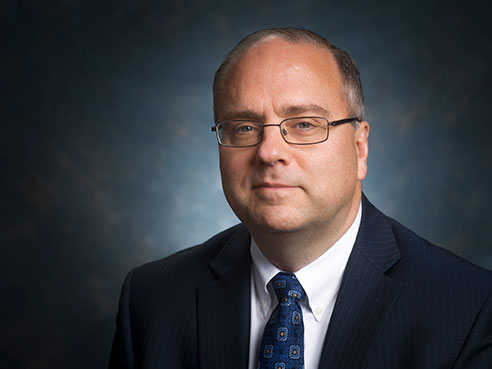 Joseph Tector, M.D., Ph.D., a leading U.S. liver transplant surgeon with clinical expertise in multivisceral and small bowel transplantation, has joined the University of Alabama at Birmingham School of Medicine as a professor of surgery.
Joseph Tector, M.D., Ph.D., a leading U.S. liver transplant surgeon with clinical expertise in multivisceral and small bowel transplantation, has joined the University of Alabama at Birmingham School of Medicine as a professor of surgery.
Tector comes to UAB from the Indiana School of Medicine, where he has been a professor since 2012. He officially joined UAB on April 1.
“We are excited to have a surgeon, clinician, researcher and teacher the caliber of Dr. Tector join the UAB School of Medicine and the Department of Surgery,” said Herbert Chen, M.D., chair of the Department of Surgery in the School of Medicine. “Dr. Tector is a renowned liver transplant surgeon, and his work in multivisceral and small bowel transplantation also has been exemplary. He cultivated his transplant program at Indiana to what is now one of the largest and most successful in the United States. He began a very successful small bowel multivisceral transplant program at Indiana, and we are planning for him to start our program at UAB in the same manner.”
Tector, who distinguished himself as an externally independent and National Institutes of Health-funded surgeon-scientist with a nationally recognized xenotransplantation research program at Indiana, served in multiple leadership positions at Indiana University and in national organizations. He will also head UAB’s new xenotransplant program.
“I’m very excited for the opportunity to come to UAB and work alongside some of the best surgeons, clinicians and researchers in the field of transplantation today,” Tector said. “This is a tremendous team dedicated to excellence in organ transplantation, research and education, all with an eye on advancing patient care and improving the quality of life of those in need of new organs. I hope to be able to add to their great work.”
Tector’s arrival will bring the addition of a multivisceral and small bowel transplant program to UAB’s Division of Transplantation. Multivisceral transplants include the liver, stomach, duodenum, pancreas and small bowel. It is reserved for patients who have organ failure involving the liver, pancreas and intestine or for patients with diffuse diseases of their intestines (such as Gardner’s Syndrome, intestinal polyposis or motility disorders such as pseudo-obstruction) associated with liver disease.
| Tector’s arrival will bring the addition of a multivisceral and small bowel transplant program to UAB’s Division of Transplantation. Multivisceral transplants include the liver, stomach, duodenum, pancreas and small bowel. It is reserved for patients who have organ failure involving the liver, pancreas and intestine or for patients with diffuse diseases of their intestines (such as Gardner’s Syndrome, intestinal polyposis or motility disorders such as pseudo-obstruction) associated with liver disease. |
Small bowel transplants are for patients with severe intestinal disease caused by conditions including Crohn’s disease, trauma, a tumor or short bowel syndrome. There are fewer than 20 active small bowel programs in the United States.
“The establishment of an integrated intestinal rehabilitation and transplant program will provide patients with a unique opportunity to be evaluated, supported and treated by a world class team of medical and surgical specialists in gastrointestinal diseases, parenteral nutrition experts and transplant surgeons in a comprehensive, coordinated facility,” Tector said.
Intestinal transplants remain the most challenging and least frequently performed vascularized intra-abdominal organ transplants, according to the National Center for Biotechnology Information; but outcomes have significantly improved over the past 15 years, and the yearly number of transplants has steadily increased.
There are many factors for this, including refinement of surgical techniques, the introduction of more powerful immunosuppressive agents, and optimization of perioperative immunosuppressive protocols, better donor and recipient selection, improvements in organ preservation, and advances in postoperative intensive care management of the high-risk intestinal transplant recipients.
To date, approximately 300 intestinal transplants have been done worldwide with long-term results that are comparable to lung transplants.
Tector received his undergraduate degree from Indiana University in 1987. He earned his doctorate at Saint Louis University in 1992 and completed his general surgery training at McGill University in Montreal, Canada, in 1999. Tector completed his fellowship in abdominal transplant at the University of Miami in 2001.
Tector earned his doctorate from McGill University in 2003.
Prior to his recruitment to UAB, Tector has been chief medical officer at the Indiana University Health Transplant Institute, chairman of the Board of Trustees at Indiana University, and medical director of organ transplantation.
Tector was very involved in teaching the Research Organ Transplant, Transplant Immunology Lab at Indiana, which is a lab technique instruction course. He has worked with Riley transplant rotation Education of Pediatric GI fellows in their Clinical Education and Conference, the Transplant Fellowship Program and adult Hepatology fellows. He has also been an instructor of The Organ Trail: New Pathways in Transplantation at IUSM Mini-Medical School and Continuing Medical Education Course at the 7th Annual Gastroenterology/Hepatology Update: Gastroenterology in Practice.
Tector has given 54 presentations in the United States and Canada, and he has published101 peer-reviewed articles and one book chapter.
Tector is the associate editor of “Xenotransplantation Journal” and editorial board member of the “World Journal of Transplantation” and “Xenotransplantation Journal.” He also is ad hoc reviewer for the “Annals of Surgery,” “American Journal of Transplantation” and the “British Journal of Surgery.”